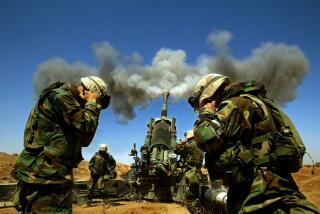Blair Feels the Political Weight of Carrying His Iraq Agenda
- Share via
With the world increasingly polarized over the prospect of war with Iraq, President Bush’s staunchest ally remains British Prime Minister Tony Blair. Yet even Blair may be starting to wonder if his purposes are entirely the same as Bush’s.
One old friend who has worked closely with Blair says that in the confrontation with Iraqi President Saddam Hussein, Blair appears to have three goals. Only on the first are Blair and Bush in complete alignment: disarming Iraq. Blair’s problem is that the path to war is unfolding in a way that undermines his other two objectives: reinforcing Great Britain’s role as a bridge between the United States and Europe, and strengthening the world community’s capacity to jointly respond to emerging threats.
Blair’s dilemma underscores the subtle but significant fault line among those supporting war. Blair is the global leader of those who believe the key to security in the 21st century is encouraging more international collaboration, a camp that includes most U.S. Democrats and some centrist Republicans, such as Sen. Charles Hagel of Nebraska. Bush is much closer to the neoconservative thinkers who believe the unfettered projection of preponderant American power is the best way to ensure global order.
As Blair contemplates the prospect of an open breach in the United Nations over war, he is painfully discovering that the disagreements between these camps are at least as significant as their common purpose in Iraq. Although Bush and Blair -- and the two sides they represent -- are walking arm-in-arm toward Baghdad, they are actually offering divergent paths for how to organize the world.
Where the two camps converge is in the conviction that the Sept. 11, 2001, terrorist attacks changed the equation for dealing with outlaw regimes like Iraq. Just as strongly as Bush, Blair insists the world can no longer allow rogue states to develop weapons of mass destruction because of the risk they will provide that terrible capacity to terrorists.
But if Blair and Bush -- and the broader camps they lead -- agree on the ends in Iraq, they remain divided on the means. Blair and his allies want a war with Iraq to demonstrate that the international community can be mobilized to confront new threats cooperatively; Bush and his camp are at best indifferent, and at worst hostile, to that vision.
This tension radiates through Blair’s other two goals in Iraq. The first of those is relatively parochial: to cement Britain’s pivotal position between Europe and the United States. Unlike the Tory governments that scorned Europe as too liberal and built close ties with America, Blair wanted Britain to have a foot in both camps -- to serve as the bridge between the Old and New World.
But Blair has been helpless to stop Bush and Germany, France and Russia from pursuing a bitter back-and-forth over Iraq that has opened the widest divide between the United States and Europe since World War II. Blair has tried to mediate; in speeches, he’s gently encouraged Bush to listen more to others, while warning the European nations that it is unfair to demand the United States “face the tricky issues alone.” Yet Blair increasingly looks as ineffectual as a marriage counselor for a couple that have decided their differences are irreconcilable.
More profoundly, Blair has made clear that for him action against Iraq is only one component of a broader new agenda for global relations. Much like former President Bill Clinton, Blair says that since the nations of the globe “today are more interdependent than ever,” the world must strengthen international institutions to attack common problems and confront rogue regimes that commit genocide, harbor terrorists or develop weapons of mass destruction. In a 1999 speech in Chicago, Blair christened this the “new doctrine of international community.”
In practice, that’s led Blair to consistently push Bush to involve the U.N. in the confrontation with Iraq. Blair has also repeatedly argued that tensions between the West and the Arab world can’t be reduced without a greater international effort to resolve the Israeli-Palestinian conflict.
Likewise, Blair not only defends the Kyoto treaty to reduce the emission of gases associated with global warming, but last month called for Europe to make greater reductions. And in that same speech, he urged a massive international effort to “promote a fairer allocation of wealth and opportunity” by bolstering development in the poorest countries. Without such economic and environmental initiatives, Blair insisted, “there will be no genuine security.”
No matter how hard Blair tries to obscure the differences, this isn’t Bush’s agenda. Bush unilaterally renounced the Kyoto treaty. Confronting global poverty doesn’t rank as high on his priority list. Nor does pressuring the Israelis and Palestinians toward negotiations. And Bush has made it abundantly clear that while he will accept U.N. support for an invasion of Iraq, he has no hesitation about proceeding without it. “When it comes to our security,” Bush insisted with more candor than tact last week, “we really don’t need anybody’s permission.”
Blair can’t afford to be so cavalier about world opinion. Practically, if not legally, Blair needs a resolution from Parliament before committing British troops, and his senior aides worry that if he can’t win a majority for war on the Security Council, he won’t get one in the House of Commons either. That’s one reason Blair has shown more interest than Bush in finding a compromise that could avoid a crackup at the U.N. this week.
But even if Blair could line up a majority at home for a war without U.N. sanction, a Security Council meltdown over Iraq would deal a terrible, perhaps mortal, blow to his broader vision of an invigorated global community.
For weeks, Blair has argued that failing to act against Hussein after he has flouted the world’s demands for disarmament would undermine the U.N.’s authority. But on the BBC last month, Blair was peppered with questions from voters asking whether the United States and Great Britain wouldn’t undermine the U.N. even more grievously if they went to war immediately after the world body said no. Blair never offered a satisfactory answer to that question, but it’s a safe bet that, as war looms, it is weighing on him more heavily than on his friend in the White House.
*
Ronald Brownstein’s column appears every Monday. See current and past Brownstein columns on The Times’ Web site at www.latimes.com/brownstein.
More to Read
Sign up for Essential California
The most important California stories and recommendations in your inbox every morning.
You may occasionally receive promotional content from the Los Angeles Times.













